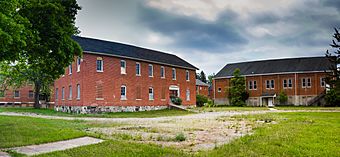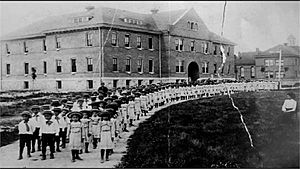Mount Pleasant Indian Industrial Boarding School facts for kids
Quick facts for kids |
|
|
Mount Pleasant Indian Industrial Boarding School
|
|

School, 2018
|
|
| Location | Bounded by Crawford, Pickard, Bamber, River Rds., Mount Pleasant, Michigan |
|---|---|
| Built | 1892 |
| NRHP reference No. | 100001795 |
| Added to NRHP | February 28, 2018 |
The Mount Pleasant Indian Industrial Boarding School was a special school in Mount Pleasant, Michigan. It was created by the United States Congress in 1891. This school was part of a plan to build many schools away from Indian reservations. These schools aimed to teach Native American children and give them job skills. It followed a model first used at the Carlisle Indian Industrial School, which started in 1879.
Contents
How the School Began
The first building of the school started construction on October 18, 1892. Over 2,000 people came to watch this important event. They gathered in Mount Pleasant and then walked to the school grounds. A special ceremony took place to lay the first stone, called a cornerstone. A religious leader also offered a prayer to bless the school and its future students.
At first, the school was known as the Mount Pleasant Indian Industrial Boarding School. The federal government ran it, along with help from a United Methodist Church mission. People sometimes called it the "farm school" because it was built on farmland. It was also close to the Isabella Indian Reservation of the Saginaw Chippewa Tribal Nation.
School Buildings and Grounds
Construction of the first school building for Native American children began in 1892. The main building was officially dedicated on October 18, 1892. On January 3, 1893, the school opened its doors to the first seventeen students. This first building had eight classrooms.
By June 1893, many more students had joined. Over the years, the school grew bigger. They built more structures to fit all the students and their daily activities.
The school had separate dormitories for boys and girls. There was also a hospital and a shop for woodworking and blacksmithing. Other buildings included a place for industrial training and a dining hall. Employees had their own clubhouse. There were also several farm buildings. In 1910, a new gymnasium was built. Next to the school, there was an "Indian Cemetery" that you can still see today.
The Students Who Attended
Native American children came to the Mount Pleasant Indian Industrial Boarding School from all over Michigan. Students also traveled from Minnesota, Wisconsin, and New York. For many years, the school had an average of more than 300 students each year.
Life at the School
Students at the boarding school received basic academic lessons from kindergarten through eighth grade. The school had a very strict daily schedule. It focused a lot on learning job skills and on religious education.
Classes taught students English, woodworking, and farming. Girls learned sewing, laundry, and housekeeping. Everyone learned basic first aid. The lessons also aimed to help students learn how to live in "white culture." It is important to know that for some students, life at these schools was very difficult.
Later Use of the Property
Classes for Native American children stopped when the school closed on June 6, 1934. The federal government then gave the property to the State of Michigan. It was used by the Michigan Department of Mental Health services.
After this, the place was called The Mount Pleasant Branch of the Michigan Home and Training School. This new school was meant to house and train young men with special needs. Many of these young men had been left without families. Some had legal issues and needed help understanding their situation. Most of the residents had some kind of mental health challenge.
The School Closes
The facility finally closed in 2008. The State of Michigan decided to close it because of budget problems and fewer people needing help there. Since then, the buildings have been empty.
Today, many windows and doors are broken or boarded up, and the buildings are in poor condition. Inside, you can find old furniture, unused medical supplies, and trash. This is because the complex was left empty after it closed, and people broke in. Now, the Saginaw Chippewa Tribal Nation owns the property. There is a plan to turn the former school into a museum.
The property was added to the National Register of Historic Places in 2018.
Images for kids
 | William L. Dawson |
 | W. E. B. Du Bois |
 | Harry Belafonte |









